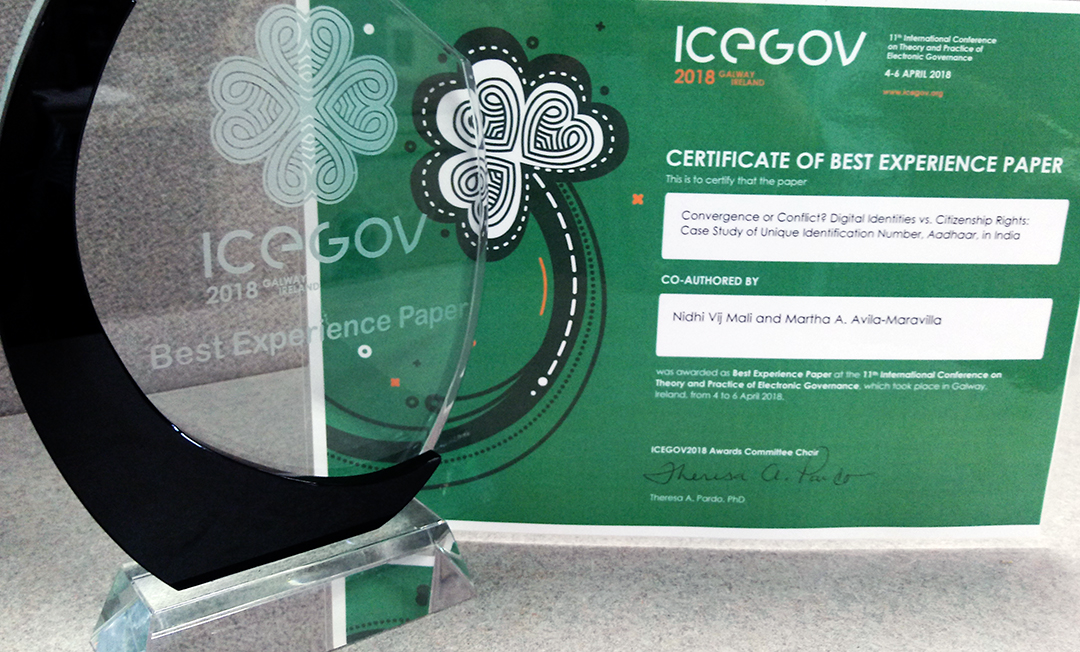CTG UAlbany colleagues win “Best Experience Paper” at ICEGOV 2018
Nidhi Vij Mali and Martha Avila-Maravilla won the Best Experience Paper award at the 11th International Conference on Theory and Practice of Electronic Governance (ICEGOV 2018) in Galway, Ireland in early April.
 Their paper, Convergence or Conflict? Digital Identities vs. Citizenship Rights: Case Study of Unique Identification Number, Aadhaar, in India, will be included in the Proceedings of the 11th International Conference on Theory and Practice of Electronic Governance which will be published by ACM Press. The paper will also be in a special issue of Government Information Quarterly is to be published by Elsevier.
Their paper, Convergence or Conflict? Digital Identities vs. Citizenship Rights: Case Study of Unique Identification Number, Aadhaar, in India, will be included in the Proceedings of the 11th International Conference on Theory and Practice of Electronic Governance which will be published by ACM Press. The paper will also be in a special issue of Government Information Quarterly is to be published by Elsevier.
While the full text of the paper is not yet available, the abstract can be seen below.
Mali is an Assistant Professor of Public Policy Leadership with the University of Mississippi, but she will start her third-straight summer as a CTG UAlbany visiting scholar later this month. Avila-Maravilla worked with CTG UAlbany as a student program assistant and is currently a Ph.D. student in the University at Albany’s Rockefeller College of Public Affairs and Policy.
The paper was one of 106 accepted papers which were split into four different categories: Complete Research Papers (64); Ongoing Research Papers (7); Experience Papers (9); Doctoral Papers (5); and Poster Papers (21). A total of 234 unique authors contributed to the conference from 44 different countries, which covered six continents: Africa, Asia, Australia, Europe, North America, and South America. A total of 184 papers were submitted to the conference which were the second-highest number of submissions to any ICEGOV conference.
Awards were given during the closing session by Pearce Flannery, Mayor of Galway in three categories: Best Research Paper, Best Experience Paper, and Best Poster.
The Best Research Paper award was given to, Continued intention to use online participatory budgeting: The effect of empowerment and habit by Mijail Naranjo Zolotov and Tiago Oliveira (NOVA University of Lisbon, Portugal) along with Sven Casteleyn (Jaume I University, Spain).
The Best Poster award was given to Serious Gaming for Developing Open Government Data Policies by Local Governments by Fernando Kleiman and Marijn Janssen (Delft University of Technology, the Netherlands) along with Sebastiaan Meijer (KTH – Royal Institute of Technology, Sweden).
All three categories were chosen by the Awards Committee chaired by CTG UAlbany Director Theresa Pardo. Manuel Bolivar, Luis Luna-Reyes, Fadi Salem, Marie Anne Macador, and Sehl Mellouli are also on the committee.
------
Abstract of Convergence or Conflict? Digital Identities vs. Citizenship Rights: Case Study of Unique Identification Number, Aadhaar, in India
Use of biometric information to access communication devices or information has become the new standard against identity theft and cybersecurity.
Integration of financial data with biometric information is enthusiastically offered as an innovative solution in improving public service delivery and individual identity protection.
Among the numerous initiatives undertaken by public and private agencies across the world, the Aadhaar, a unique identification number initiative in India, stands out.
It seeks to link demographic, biometric, financial and real-time behavioral information to a 12-digit number unique to every individual in a 1.3 billion population country by the Government of India, thus, creating an end-to-end digital identity for each citizen.
This integrated database benefits verification, and curb corruption in policy service delivery.
However, government ownership and control of this extensive digital information about citizens has also raised concerns about potential internal and external data breaches, and whether such level of information with the government is even essential or constitutional, opening up technical, legal, and constitutional criticisms.
This case study highlights the of the trajectory and development of Aadhaar initiative, the security and state-citizenship rights conflicts, and the recent Supreme Court of India judgment upholding a citizens’ rights of privacy and protection.
The implications of this first-ever technological and judicial debate serve as a precursor to policymakers and practitioners for the potential threats and conflicts that can emerge when digitization, data integration, and biometric authentication are perceived as a panacea for every governance problem.